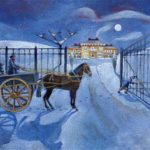
Clockwise from top right: Tom Kerr and Rose Murray-Kerr, Kerr's Corner Books; Lou Pamenter, Furby House Books; Jennifer Bogart, Let's Talk Books; Dan and Kathryn Corbett, Lighthouse Books; David and Barbara Sweet, Books & Company;
Community bookstores choose to write their own chapter.
We could be forgiven for assuming the pandemic would write the final chapter for independent bookstores. Over the decades, these proverbial Davids had survived the might of big-box store Goliaths, followed by the ascent of online retail giants. The global pandemic, however, was a particularly rough beast, shuttering small businesses – 100,000 in April 2020 alone according to Statistics Canada – and driving an unprecedented number of shoppers online. In this volatile climate, the fate of the humble neighbourhood bookstore, where owners hand-sold books to locals and chatted about favourite titles over tea, seemed very dire indeed.
Then something unexpected happened. Those bookstores survived, and even – in many cases – thrived. The story of how they did so is one of perseverance and passion, of customization and true community spirit. Or as Lou Pamenter, owner of Port Hope’s Furby House Books, puts it, “During the pandemic, we found new ways to do what we love, and, most importantly, we learned that we could rely on our customers to support us.”
The hallmarks of a classic indie bookstore are rooted in the personal: booksellers bond with their customers over a shared love of reading, then build relationships by learning, anticipating and shaping their preferences. The challenge with the COVID shutdown was how to deliver that experience when face-to-face contact was impossible.
“We offer our expertise, great customer service and the ability to recommend books to our customers based on their interests. We know our customers and our customers know us. That gives us a huge advantage.” David Sweet
For Kathryn and Dan Corbett, owners of Lighthouse Books in Brighton, the solution was to improvise, then improvise again. “We’re a small store in a small town – we’re supposed to be about customer service,” says Kathryn, who bought Lighthouse with her husband in 2016. “It wasn’t our thing to force people to go online to shop with us.” When the lockdown struck, the Corbetts turned their trusted retail model on its head: they set up a user-friendly website for book orders and offered curbside pickup and free local delivery. Their customers responded enthusiastically. “We have great customers who come to us before they would go to a box store or order online,” says Kathyrn. “They know that I’ll have what they want, particularly if it’s being spoken about on the CBC, if it’s an award nominee or on the Star bestseller list – if it’s more obscure, they know I’ll order it for them.” For Kathryn, a former school librarian, the personal touch is key. “I get a lot of joy out of connecting people with books, probably because I’m such a big book lover myself. It’s part of our fabric to want to share good books with people in the community.”
Jennifer Bogart, the owner of cheery Let’s Talk Books in Cobourg, agrees: “You don’t own a bookstore to get rich – it’s always going to be a passion about books and authors and the local community.” Like the other book sellers, Jennifer credits a blend of accessible technology and customer loyalty for her store’s success during COVID. “We tried to make everything as personal as we could under the circumstances. We made sure that when the phone rang, we answered it and returned emails as soon as we could.”
During the months of isolation, small personal touches resonated deeply with homebound customers. “Everybody needed that extra bit of care and concern,” Jennifer explains, “so having a store that phoned people back and could offer a familiar voice made people feel taken care of.” It helped create a sense of normalcy for her too. “The joy is the connections we make with our customers, so that everyone feels like they’re part of a big family.”
As in any big family, listening is crucial. During COVID, booksellers heard how their customers’ needs were changing and adapted accordingly. The Corbetts of Lighthouse Books ordered a greater number of birdwatching kits, while Lou Pamenter at Furby House Books started stocking a wide selection of games and puzzles. David Sweet, the coowner (with wife Barbara) of Books & Company in Picton, reports that the store sold more cookbooks, gardening books and how-to sketching and painting books. “People have had more time to read and to focus on the activities that they enjoy,” says David, who notes that Books & Company also experienced an uptick in fiction sales. “Books provide comfort and escape, and I believe that over the past year and a half, many people have been looking for both those things.”
People have also been looking for ways to shop and support local. During the same period that Amazon grew its business by $570 billion, a grassroots movement to support small businesses swelled. A 2021 Canadian survey from Interac Corp. showed that 75 per cent of respondents said the pandemic made supporting community businesses more important; close to half were willing to wait longer for delivery or pick-up in order to support local – good news for indie bookstores, which offer custom ordering for out-of-stock titles.
“Indie bookselling is most definitely recovering – and even expanding,” confirms Doug Minett, executive director of the Canadian Independent Booksellers Association. “This phenomenon seems to be widespread: communities seem to be embracing localism – and innovative bookselling is the gold standard of local retail.”
Steven Beatty, who has written extensively on the Canadian bookselling scene for book trade magazine Quill & Quire and his blog That Shakespearean Rag, traces the resurgence to a hunger for both a sense of community and for knowledgeable booksellers. “Since COVID especially, people are more interested than ever in making that human connection,” he says. “They’ve been restricted to very small communities, and that’s forced them to rediscover a smaller, more communal mentality.” As for the expertise on offer at indie bookstores: “You don’t get that at the chains. The best that big-box stores can provide is a warehouse for a large quantity of books. The smaller scale at an indie allows a bookseller to have a very different relationship with their clientele. The customer will come to trust you if you’ve recommended a book that they enjoyed, and they’ll come back again for recommendations. Even if you find a knowledgeable bookseller at a box store, you don’t know if they’ll be there the next time you come back.”
That’s a point of distinction that David Sweet prides himself on. “All independent booksellers have had to deal with the competition from big-box stores and online bookselling,” he says. “We can’t afford to offer deep discounts on books, but we can offer our expertise, great customer service and the ability to recommend books to our customers based on their interests. We know our customers and our customers know us. That gives us a huge advantage.”
Showcasing work by local authors also deepens that sense of community connection, allowing readers, retailers and authors to share their passion for regional history, culture and nature. Tom Kerr, the co-owner with his wife Rose of Kerr’s Corner Books in Campbellford, has a blunt open door policy: “We carry almost any author who wants to promote their book – as long as it’s not really crappy!” Tom takes six books from local authors for six months; if they sell out, he orders more. Furby House Books devotes several shelves at the front of the store to Canadian literary icon Farley Mowat, who made Port Hope his home later in life, while Picton’s Books & Company carries dozens of titles by writers from Prince Edward County and surrounding area. “We work closely with local book publishers to ensure that we have their titles in stock, and that we maintain our stock levels,” says David Sweet. “Before the pandemic, we hosted many readings and book-signings at our store. Hopefully we’ll once again be able to host live events in the months ahead.”
“I get a lot of joy out of connecting people with books, probably because I’m such a big book lover myself. It’s part of our fabric to want to share good books with people in the community.” Kathryn Corbett
Jennifer Bogart of Let’s Talk Books has included events as part of her pandemic pivot, starting with a fall reading series that proved popular. “We were able to convert our parking area behind the store into an outdoor event space,” she says. “We invited local poets and authors who are releasing new books this year. We did seven weeks of Wednesday night readings. We’ll probably do it the same way next year – it’s a lovely outdoor space.”
The booksellers say they are cautiously optimistic about the future. Tom Kerr says Kerr’s Corner Books has a profitable sideline in custom-made rubber stamps and he’s seen a slow return of customers to the store in recent months. “Campbellford relies quite heavily on the summer tourist trade, but that didn’t happen for the last two summers,” he says. “We’re starting to get more traffic in the store again, but I would say it is a very cautious consumer coming in.”
At Furby House Books, Lou Pamenter says she’s learned a lot about her business and her customers. “The pandemic taught us that we could cope with more online orders, we could function at the back door, we could make deliveries.” She and her staff doubled down on doing what they do best. “The staff and I provide a vital link to the community; we know the customers and their reading preferences and can recommend accordingly. Bookstores are meant for browsing; one should discover the unexpected. That means finding books that will appeal to our regular customers and also attract the interest of the out-of-towners.”
For Lou and her fellow booksellers across the counties, the COVID crisis was also an opportunity to reflect on why they threw in their lot with the high-demand, low-profit, exhausting and exhilarating world of independent bookselling. It’s about the passion for books and the chance to spend time with the people who love them.
“It’s hard to convey the joy I receive,” Lou says, “when I’m in the store with customers who are enjoying their time there or seeing the smiles as children listen to the Tuesday morning storyteller, or the delight when a new book arrives, smelling just like a new book.”
WINTER READING SUGGESTIONS FROM OUR LOCAL BOOKSTORE OWNERS
Books & Company
289 Main St., Picton
David and Barb Sweet’s Picks
Growing Up Big Island, Terry Sprague*
The well-known naturalist, author and speaker writes about his childhood on Prince Edward County’s Big Island in the 1950s.
The Mystery of Right and Wrong, Wayne Johnston
Known for his historical fiction about Newfoundland, Wayne Johnston again mixes history and fiction for his latest novel.
The Strangers, Katherena Vermette
A moving tale of the often-tragic lives of Indigenous women and girls.
Furby House Books
65 Walton St., Port Hope:
Lou Pamenter’s Picks
Isadora’s Dance, Donna Wootton*
A literary romance set in 2010, Isadora’s Dance tells the story of a young woman who follows her muse and finds love while travelling abroad.
The Jolly Postman, Allan Ahlberg
Was there really a time before email? This illustrated classic depicts imaginary correspondence between characters from fairy tales and Mother Goose.
These Precious Days, Ann Patchett
The best-selling author and bookseller/blogger offers a stimulating series of essays that share what’s in her mind and heart.
Kerr’s Corner
39 Bridge St. E., Campbellford
Tom Kerr and Rose Murray-Kerr’s Picks
Braiding Sweetgrass: Indigenous Wisdom, Scientific Knowledge and the Teachings of Plants, Robin Wall Kimmerer
A mother and scientist, Professor Kimmerer writes about how all living things can offer us gifts and lessons in life.
Five Little Indians, Michelle Good
The award-winning Cree novelist tells this story from the points of view of five former residential school students as they struggle to survive in 1960s Vancouver.
Hard Drive, Mark Collins*
Classic crime novel featuring Jack Wright, a veteran detective who serves with the Toronto Police Service.
Let’s Talk Books
25 King St. E., Cobourg
Jennifer Bogart’s Picks
Alderville First Nation: A History, Brian Beaver*
This book relates the unique history of the people of Alderville First Nation and candidly focuses on the misguided attempts to assimilate Indigenous people.
The Boy, the Mole, the Fox and the Horse, Charlie Mackesy
Featuring 100 colour and black-and-white drawings, this book by British illustrator and author Charlie Mackesy offers inspiration for readers of all ages.
The Good Fight, Ted Staunton and Josh Rosen*
A graphic novel by the award-winning children’s author, this story is set in Toronto in the 1930s and highlights prejudice, xenophobia and social injustice.
Lighthouse Books
65 Main St., Brighton
Kathryn and Dan Corbett’s Picks
Off the Record, Peter Mansbridge
Veteran broadcaster and former CBC anchor Peter Mansbridge takes us through his never-boring life and career as a journalist.
Renegades: Born in the USA, Barack Obama and Bruce Springsteen
An entertaining and enlightening series of dialogues between President Barack Obama and legendary musician Bruce Springsteen.
The Wreck of HMS Speedy: The Tragedy That Shook Upper Canada, Dan Buchanan*
Dan Buchanan writes about the sinking of the ship in 1804 off Presqu’ile Point and the modern-day search to find her.
*Local Authors
Story by:
James Grainger


